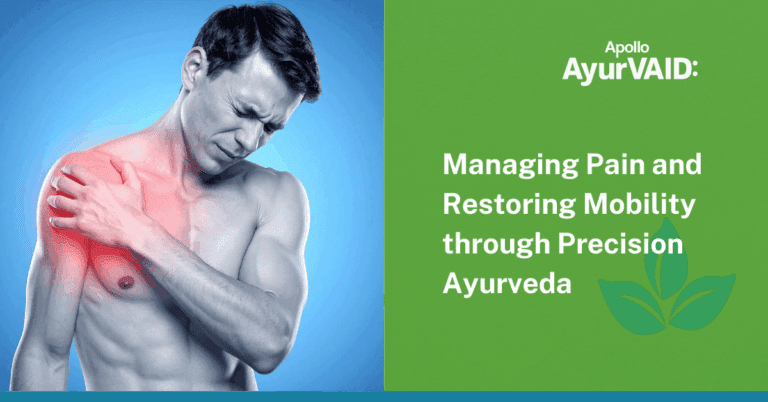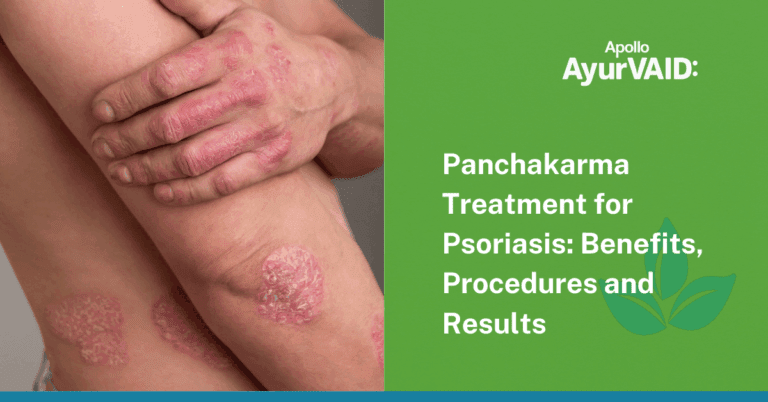If you’re reading this, you or someone you love might be struggling with digestive issues that just won’t go away. You had to postpone plans due to an unforeseen toilet emergency. Perhaps you’re exhausted from sleepless nights dealing with abdominal pain. Or maybe you’re simply tired of feeling like your body is working against you.
The symptoms of inflammatory bowel disease can be unpredictable, including fatigue, unexpected pains, and anxiety about what might happen next. This blog will outline inflammatory bowel disease types, inflammatory bowel disease causes, common inflammatory bowel disease symptoms, and how Ayurveda approaches inflammatory bowel disease treatment with individualised, evidence-informed protocols that work alongside modern medicine.
What is IBD
Inflammatory bowel disease (IBD) is an umbrella term for chronic inflammatory conditions of the intestine, most commonly ulcerative colitis and Crohn’s disease. These are illnesses with relapsing and remitting inflammation of different parts of the gut, and they produce symptoms that can range from mild discomfort to severe, life-changing flare-ups. Current biomedical research shows that IBD arises from an inappropriate immune response to the gut environment in genetically susceptible people, with the gut microbiota and environmental triggers playing central roles.

The common inflammatory bowel disease symptoms to watch for
Patients most often describe a combination of persistent diarrhoea (sometimes with blood), abdominal pain or cramping, urgency, unintended weight loss, low energy and fever during flares. Extra-intestinal features — joint pains, skin changes, eye inflammation — may also occur, reminding us that IBD is a systemic inflammatory condition and needs holistic care.
Inflammatory bowel disease types
Broadly, there are two principal forms:
- Ulcerative colitis – limited to the colon and rectum with continuous mucosal inflammation
- Crohn’s disease – which may affect any part of the gastrointestinal tract in a patchy, transmural fashion.
- Some patients have indeterminate colitis where features overlap; each subtype has different risks, complications and therapeutic needs.
These ingredients help balance Vata and build comfort over time — not a quick fix, but a dependable companion.
Why does IBD happen? — Inflammatory bowel disease causes
Modern research reveals a convergence: host genetics, dysregulated immune responses, an altered gut microbiome, and environmental factors (including diet, infections, antibiotics, and smoking) interact to trigger and perpetuate mucosal inflammation. These elements act together rather than singly, which is why personalised, layered treatment strategies are essential.
The Ayurveda perspective - concepts of IBD
In Ayurveda, many chronic diarrhoeal and inflammatory disorders correspond to Pravahika, Grahani and other digestive afflictions. Ayurveda sees inflammatory bowel disease as layers of imbalance building over time:
- Your Digestive Fire Weakened Gradually: Maybe you grew up eating at irregular times, or you’ve developed habits like eating while stressed, combining incompatible foods, or relying on processed meals. Each of these gradually dims your digestive fire until it can barely function.
- Stress Became Your Constant Companion: Does your job keep you awake at night? The relationship anxiety you carry? Do you worry about your finances? Chronic stress aggravates Vata dosha, which directly disrupts your intestinal function and weakens immunity. Your gut literally feels your emotions.
- Food Choices Added Fuel to the Fire: Excessive spicy foods, too many fried items, irregular eating patterns, eating while emotionally upset—all these contribute to inflammatory bowel disease caused by creating more toxins than your body can handle.
- Lifestyle Patterns That Backfired: Whether it’s irregular sleep schedules, suppressing the urge to use the bathroom during meetings, or inadequate rest, these seemingly small choices accumulate over time.
Finding Real Relief: Inflammatory Bowel Disease Treatment at Apollo AyurVAID
Now, here’s where things get hopeful. Inflammatory bowel disease treatment at Apollo AyurVAID isn’t about just suppressing your symptoms with increasingly stronger medications. It’s about actually addressing why your body is in this state and giving it what it needs to heal.
The Journey Back to Balance:
Phase 1: Rekindling Your Digestive Fire (Deepana-Pachana). We start gently. Think of it like carefully bringing embers back to life—you can’t just throw logs on dead coals. We use specific herbs that stimulate your digestive capacity without irritating your already inflamed gut. This is a foundational inflammatory bowel disease treatment.
Phase 2: Eliminating the Toxins (Ama Pachana). Keep in mind that Ama I was talking about—those undigested toxins? Digest and get rid of them. It’s similar to unclogging a drain before you can expect water to move easily again. Certain herbal preparations undertake this task slowly and safely.
Phase 3: Soothing the Storm (Shamana Chikitsa) Here, certain formulations and herbs are used. These herbs and preparations aid in healing the intestines by avoiding inflammation, regulating diarrhoea, firming up the intestinal walls, soothing digestion, and soothing the mucosa with cooling as well as antioxidant properties.
Phase 4: Deep Cleansing When Ready (Panchakarma) After your body is ready, certain Panchakarma treatments, like Virechana (purgation) and Vasti (enema), provide deep inflammatory bowel disease treatment.
Phase 5: Developing Long-Term Strength (Rasayana) Once cleansed, we reconstruct. Rejuvenative herbs support your intestinal tissues, bolster immunity, and prevent flares from occurring in the future. This exercise is about developing long-term health, not temporary fixes.
What You Eat Matters Tremendously:
Let’s talk about food—not as a restriction, but as medicine. Your inflammatory bowel disease treatment must include dietary wisdom:
Foods That Heal:
- Warm, freshly cooked meals (your gut doesn’t want to work extra hard on cold, raw foods)
- Rice preparations with gentle spices like cumin, coriander, and fennel
- Well-cooked vegetables (avoiding gas-producing ones like cabbage and broccoli)
- Buttermilk prepared the Ayurveda way—it’s incredibly healing for your gut
- Pomegranate juice for its astringent and tissue-healing properties
- Soups made with healing herbs and easy-to-digest lentils
Foods to Avoid:
- Raw salads and cold foods
- Processed and packaged foods
- Excessive dairy products
- Spicy, oily, deep-fried items
- Incompatible food combinations (like milk with salty or sour foods)
Your Daily Rhythm Matters:
Inflammatory bowel disease treatment extends beyond medicine into how you live each day:
- Regular sleep-wake cycles (your gut heals during sleep)
- Stress-reduction practices—meditation, gentle pranayama
- Yoga asanas that support digestive health (nothing strenuous)
- Never suppressing natural urges (especially for bowel movements)
- Creating peaceful, unhurried meal times
Safety, integration & expectations — honest counsel
Practical tips for patients
- Keep a symptom-diet diary: note foods, stressors, and medication changes associated with flares.
- Prioritise small, easy-to-digest meals that respect your personal tolerance and agni.
- Practice gentle daily routines (early sleep–wake cycle, mindful eating, warm water sips) to stabilise Vata and Pitta.
- Discuss any herbal supplements with both your gastroenterologist and your Ayurveda practitioner to avoid interactions.
If you or a loved one is living with IBD, you should know that compassionate, patient-centred care is available. At Apollo AyurVAID, we combine clinical rigour, traditional wisdom and personalised care to reduce suffering and restore function.






